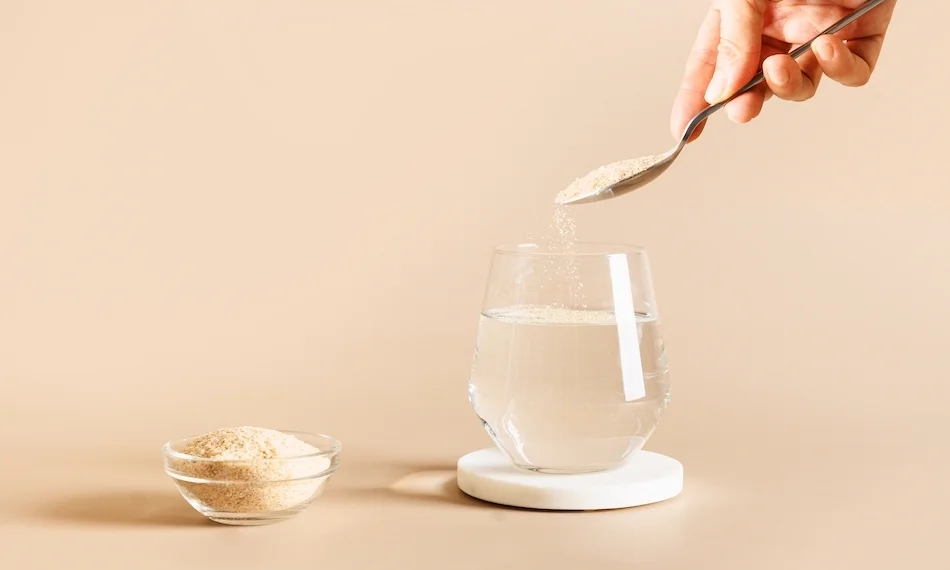Glucomannan for Weight Loss: The Science Explained
Uncover the research-backed reasons why glucomannan is making waves in the wellness community.

From appetite-suppressing teas to fat burners, many products on the market claim to be the best for aiding weight loss. While some are beneficial, others are simply marketing fads, and may actually do you more harm than good.
Supplements containing natural ingredients are just one type of product in this category. They are quickly attracting interest for their inclusion of plant extracts, which may provide several benefits for those hoping to lose weight.
But what does the scientific research say regarding glucomannan, a type of fiber often used in these supplements? Join us as we explore the pros, cons, and safety risks of taking glucomannan, and discover whether it could be an effective solution to your weight loss woes.
Glucomannan for Weight Loss: Is It a Game-Changer?
As a low-calorie, soluble fiber, glucomannan may help you to lose weight in a variety of ways. While reducing the absorption of nutrients like fat and protein, it also expands in the stomach and delays emptying, which helps to keep you fuller for longer.
These benefits make glucomannan an effective weight loss supplement. In one randomized controlled trial, 176 healthy overweight subjects were given 1 of 3 different fiber supplements before meals, all containing glucomannan. Compared with the placebo, all subjects saw a significant reduction in body weight over a 5-week period.
However, steering through the data, it’s clear that glucomannan supplementation works best when used in combination with a calorie-controlled diet. This encourages your body to burn more calories than you’re consuming, and is key for weight loss.
What Is Glucomannan?
Extracted from the roots of the konjac plant, or elephant yam, glucomannan is a natural dietary fiber. It is most traditionally found in herbal mixtures and foods such as tofu and konjac jelly, but can also be used as an emulsifying and thickening food additive.
Along with being the main ingredient in shirataki noodles, a high-fiber, low-calorie food, glucomannan is added to supplements and drink mixes because of its impressive and unique water-absorbing properties.
In other words, it has the ability to turn the liquid it absorbs into a gel, particularly in the stomach, which is why this viscous fiber is thought to be effective for weight loss.
How Does Glucomannan Affect Weight Loss?
As a viscous dietary fiber, glucomannan has the potential to make your weight loss journey go much more smoothly. Let’s dive into the evidence:
#1 Provides a feeling of satiety
Glucomannan is a soluble fiber, which dissolves in water and expands to form a gel-like substance. What makes glucomannan unique is that it is one of the most viscous dietary fibers to exist, especially when compared to others such as psyllium husk.
When it reaches the stomach, this allows the gel to take up a significant amount of space, therefore promoting feelings of fullness.
Glucomannan has also been shown to delay gastric emptying, increasing satiety and stopping you from overeating at meal times. Taking a glucomannan supplement may therefore naturally lower your calorie intake to prevent weight gain.
#2 Reduces blood sugar levels
By forming a gel, soluble fibers like glucomannan help to slow digestion. As well as keeping you full, this prevents the blood sugar spikes and crashes that often occur after eating, which can contribute to cardiovascular disease in the long term.
Research indicates that glucomannan can therefore improve glycemic control for patients with type 2 diabetes. One study found that taking 1 gram of this fiber 30 minutes before ingesting glucose could significantly lower the rise of blood sugar levels for up to 2 hours afterward.
#3 Low in calories
Glucomannan is known for its very low calorie content, which makes it a great weight loss food. For example, 100 grams of shirataki noodles contains just 9 calories, yet 2.7 grams of fiber.
This means that you can consume large amounts of this appetite-suppressing fiber without worrying about your calorie intake, therefore allowing you to maintain a calorie deficit for weight loss.
#4 Reduces the absorption of protein and fat
Another key benefit of glucomannan’s viscous properties is that it forms a gel around food particles as they go through the digestion process. Along with slowing the rate of digestion, this also might reduce the absorption of nutrients such as proteins and fats.
Consuming an excess amount of these nutrients bumps up your calorie intake, so by lowering their availability, glucomannan may help to minimize weight gain.
Other Benefits of Glucomannan
Aside from aiding weight loss, glucomannan also performs several other important functions throughout the body, making it a great dietary supplement for maintaining your overall health. Below are some of glucomannan’s other key benefits:
#1 Improves gut health
Glucommanan is a fiber with prebiotic properties. Prebiotics feed and support the growth of friendly bacteria, known as probiotics, and prevent harmful bacteria from colonizing your intestines.
The nourishment that these prebiotic fibers provide can relieve symptoms of digestive disorders like irritable bowel syndrome (IBS), such as bloating, diarrhea, and constipation, while improving your overall gut health.
Glucomannan has also been shown to help convert good probiotic bacteria into short-chain fatty acids like butyrate that may protect against fat gain.
#2 Lowers cholesterol
As well as reducing protein and fat absorption, glucomannan may also lower the absorption of cholesterol in the gut. This has been shown to decrease triglycerides, a type of blood fat that can lead to heart disease, along with total cholesterol, “bad” LDL cholesterol, and fasting blood sugar levels.
All of these factors reduce your risk of developing chronic conditions such as type 2 diabetes and cardiovascular disease.
#3 Has antioxidant properties
Oxidative stress occurs in the body when it becomes overrun with free radicals, molecules that damage tissues, proteins, and DNA in your body. This can cause a range of conditions, such as diabetes, inflammation, high blood pressure, cancer, heart disease, and Alzheimer’s.
As an antioxidant, glucomannan fights these free radicals, and has therefore been shown to help those with type 2 diabetes.
Glucomannan Side Effects
When taken in the right doses, glucomannan is evidently a top contender to promote weight loss. However, it can cause some mild digestive discomfort for those who generally eat a low-fiber diet, including bloating, excess gas, and diarrhea.
To prevent these symptoms, slowly add glucomannan into your diet gradually, allowing your body time to adjust to the increased fiber intake.
Glucomannan can have some more serious side effects. If not taken with 1 to 2 glasses of water, the highly viscous fiber may expand in your throat or esophagus before it reaches the stomach, blocking the tube and causing a choking hazard.
You should always consult your doctor if you are on any other medications, as glucomannan may interact with, and reduce the effectiveness of, diabetes drugs like sulfonylurea.
How to Use Glucomannan As a Weight Loss Supplement
Compared with other fiber supplements, it’s recommended to take glucomannan at a lower dose of between 2 to 4 grams per day due to its ability to expand in the stomach. If you’re unsure of the right dosage for you, consult your doctor for further advice.
To fully experience glucomannan’s appetite-suppressing effects, you should take it anywhere from 1 hour to 15 minutes before a meal, 3 times per day, for best weight loss results.
Consuming the fiber with water not only prevents choking, but also keeps you hydrated, which has been shown to potentially increase your body’s fat-burning mechanisms. If you struggle to keep your water intake up, try adding mint and lemon, or drinking coconut water for an alternative delicious taste.
As well as in capsule and gummy form, glucomannan also comes in a powder. You can add this to your favorite soups, sauces, and green smoothies as a thickening agent, or even use it while baking for a boost of dietary fiber.
Glucomannan vs. Psyllium Husk
In terms of weight management and digestive health, glucomannan and psyllium husk are two popular options. Known for their fiber content, both of these foods can promote satiety, control blood sugar levels, and improve bowel regularity, among other health benefits. They are similar in some ways, yet differ in their source, mechanism of action, and additional benefits.
| Feature | Glucomannan | Psyllium Husk |
| Source | Root of konjac plant | Seeds of the Plantago ovata plant |
| Type of fiber | Soluble fiber | Mostly soluble fiber with some insoluble components |
| Water absorption | Can expand up to 50 times its weight | Can expand up to 10 times its dry weight |
| Impact on digestion | Slows digestion and delays gastric emptying | Regulates bowel movements and slows digestion |
| Weight loss | It is low in calories and often marketed as a weight-loss product | Low in calories and can be used as a weight loss aid |
| Impact on blood sugar levels | Stabilizes blood sugar levels by slowing glucose absorption | By slowing digestion, it helps control blood sugar levels |
A Word From Our RD


Dietary fiber is an important carbohydrate for maintaining good gut health, keeping your blood glucose levels in check, and aiding weight management, particularly if you’re eating less but still struggling to shed the pounds.
Although the recommended fiber intake varies based on your age and gender, it’s generally advised to consume between 25 to 30 grams per day. Unfortunately, 95% of people struggle to achieve this goal.
Some of the best ways of upping your fiber intake include filling your plate with fruits and vegetables, choosing whole grains, and adding legumes to your meals. You could also take a fiber supplement, which often include ingredients such as psyllium husk and glucomannan that are ideal for weight loss.
However, supplements aren’t suitable for everyone, so check with a health professional before adding them to your daily routine.
FAQs
As long as you stick to the recommended dose, and drink plenty of water each time, no serious effects have been reported when taking glucomannan for long periods. It may cause some digestive discomfort, such as bloating and gas, at first, but these symptoms should disappear as your body adjusts.
Taking glucomannan with other medications may decrease their effectiveness, by lowering how much of the medicine you absorb. You should, therefore, check with your doctor before using the supplement. They may advise you to leave a few hours between taking your medication and glucomannan.
To properly experience the weight loss, blood sugar, and gut health benefits of glucomannan, you should take the supplement 3 times each day, sticking to the recommended doses.
Conclusion
When it comes to weight loss, glucomannan supplements are evidently a top contender for their impressive ability to expand after making contact with water. They may therefore help to suppress your appetite, control blood sugar levels, and reduce nutrient absorption.
While all of these factors make glucomannan a promising weight loss ingredient, you’ll need to combine this with a calorie-controlled diet and regular exercise to see results. You should also remember to drink plenty of water to avoid choking, and stick to the recommended daily dosage.
Before starting with any weight loss supplement, it’s important to consult a healthcare professional first, who can evaluate whether it is safe for you.

















































 Select your language:
Select your language: 







